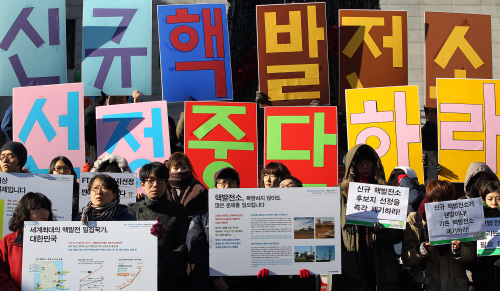Civic groups, environmentalists, residents stage protests, voicing safety concerns
The government’s plan to install new nuclear reactors in the country’s eastern shore faces stiff opposition from residents, stoking safety concerns in the aftermath of a Japanese disaster.
Last week, the government picked two candidate sites for nuclear power plants --Yeongdeok in North Gyeongsang Province and Samcheok in Gangwon Province. The decision will be finalized by late next year after on-site inspections and environmental surveys.
The announcement comes as part of Korea’s plan to shake off its dependence on energy imports and cope with spiraling demand for electricity. It aims to jack up the share of nuclear energy to 40 percent of the nation’s power grid from the current 30 percent by 2030.
On Monday, civic groups, religious organizations, environmentalists and residents staged a mass rally in downtown Seoul and the two regions, calling to scrap the country’s atomic energy policy.
“The government’s latest site selection completely neglects a global anti-nuclear trend that has been reigning supreme since the Fukushima meltdown in March,” Green Korea United, one of the country’s major environmental groups, said in a statement.
The government’s plan to install new nuclear reactors in the country’s eastern shore faces stiff opposition from residents, stoking safety concerns in the aftermath of a Japanese disaster.
Last week, the government picked two candidate sites for nuclear power plants --Yeongdeok in North Gyeongsang Province and Samcheok in Gangwon Province. The decision will be finalized by late next year after on-site inspections and environmental surveys.
The announcement comes as part of Korea’s plan to shake off its dependence on energy imports and cope with spiraling demand for electricity. It aims to jack up the share of nuclear energy to 40 percent of the nation’s power grid from the current 30 percent by 2030.
On Monday, civic groups, religious organizations, environmentalists and residents staged a mass rally in downtown Seoul and the two regions, calling to scrap the country’s atomic energy policy.
“The government’s latest site selection completely neglects a global anti-nuclear trend that has been reigning supreme since the Fukushima meltdown in March,” Green Korea United, one of the country’s major environmental groups, said in a statement.

In Samcheok, Gangwon Province Gov. Choi Moon-soon added fuel to the flame by expressing his regret over the announcement. “It’s hard to understand the government is pushing ahead with its nuclear expansion program at a time when there is no national consensus and public understanding of the safety of the plan,” he said.
While most Yeongdeok residents are believed to back the project on hopes to rejuvenate the local economy, some remain jittery, citing the region’s geological features that are fragile to natural disasters like earthquakes.
In the wake of the Japanese debacle, Germany, Switzerland and Italy and other countries adopted plans to phase out or cut back their nuclear facilities.
But Korea, which has an ambition as a new leader in nuclear power plant construction following a landmark export to the United Arab Emirates in 2009, clings to its standpoint. Japan has also no plan to abandon its stations.
Nuclear power is not an option but a must, the government said, to boost energy security of Asia’s fourth-largest economy.
“We acknowledge the growing safety concerns about new reactors due to the Fukushima crisis, but atomic energy is the most practical source for us given its stable electricity supply, economic feasibility and the impact of climate change,” an official at the Ministry of Knowledge Economy said.
State-run Korea Hydro and Nuclear Power Co. runs 21 reactors in the country’s south. The first one in Gori began operation in 1972. The plants have not had any major accident ever since.
To rally public support, authorities vowed full-fledged safety checks and cautionary, transparent measures to ensure safety and security of the plants.
“It’s essential for the government to keep close watch on existing and new facilities and conduct thorough maintenance, taking lessons from Japan,” Knowledge Economy Minister Hong Suk-woo told a local broadcaster on Sunday.
Among the imminent issues is the storage of spent radioactive fuel rods that will run of space in 2016. The ministry plans to host a public forum in the first half of next year to discuss how to take care of such obsolete equipment, Hong said.
By Shin Hyon-hee (heeshin@heraldcorp.com)
-
Articles by Korea Herald







![[KH Explains] How should Korea adjust its trade defenses against Chinese EVs?](http://res.heraldm.com/phpwas/restmb_idxmake.php?idx=644&simg=/content/image/2024/04/15/20240415050562_0.jpg&u=20240415144419)











![[Today’s K-pop] Stray Kids to return soon: report](http://res.heraldm.com/phpwas/restmb_idxmake.php?idx=642&simg=/content/image/2024/04/16/20240416050713_0.jpg&u=)